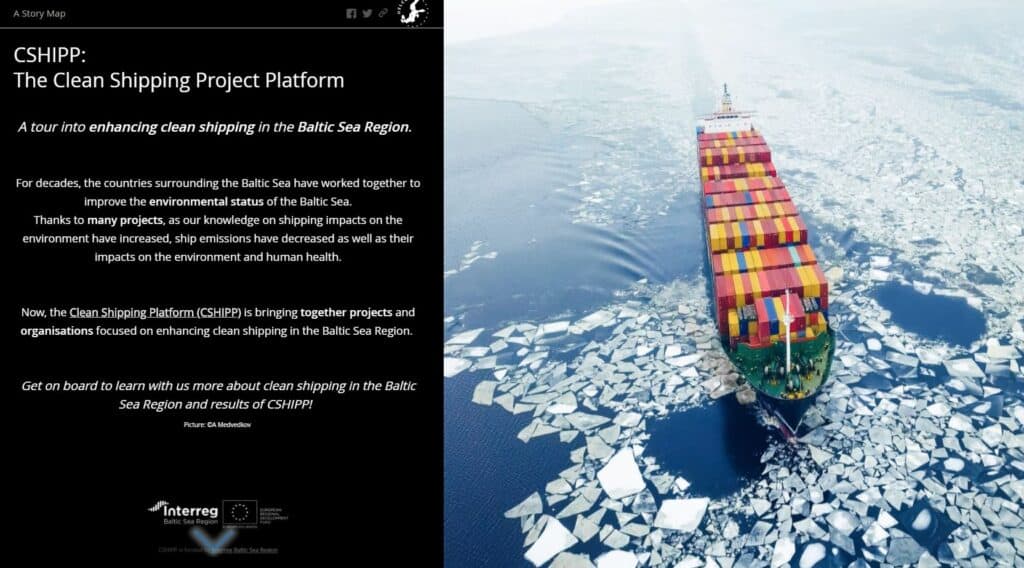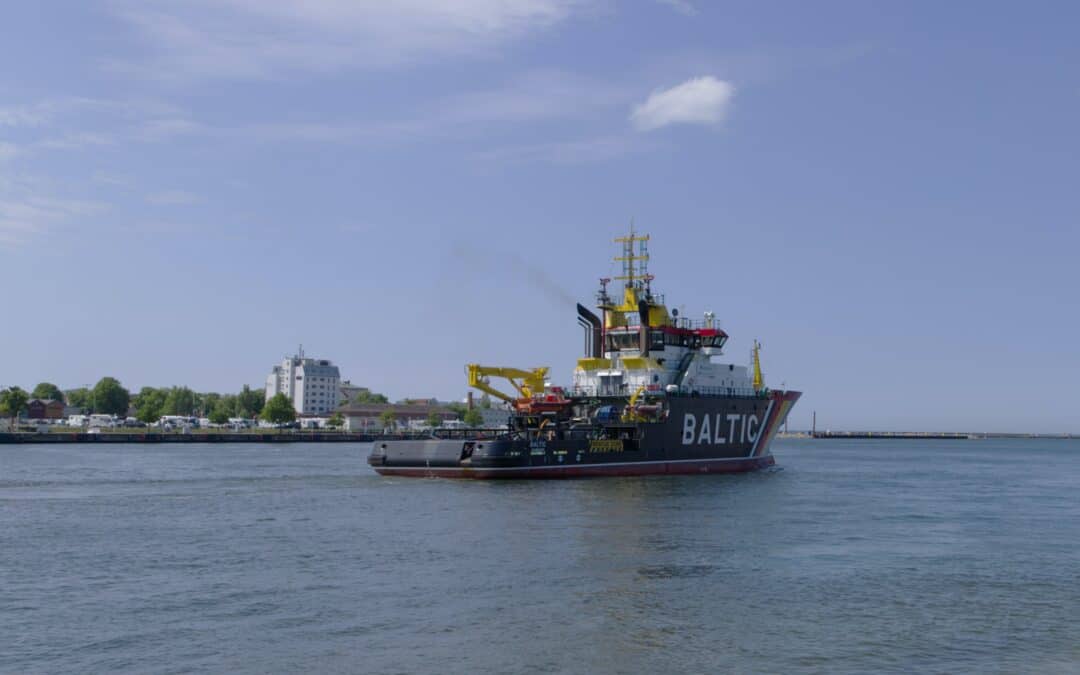Policy makers, researchers and industry should sail in the same direction when working on a better environmental state of Baltic Sea waters and a competitive, flourishing maritime business. The Interreg project platform CSHIPP proved this to be possible.
Growing demand for clean shipping practices
The Baltic Sea has been an important maritime trade route for centuries. As the volume of trade and passenger transportation continued to grow, so did the number and size of ships. This has resulted in increasing emissions and discharges from shipping that are damaging the sea’s unique and fragile ecosystem.
However, the environmental impacts of maritime transportation have started to receive due attention. The maritime industry has become under pressure to comply with stricter requirements and public demand for sustainable practices.
Thanks to environmental regulations, research and new technologies, the Baltic Sea region has become a front-runner in clean shipping activities in many ways. However, the existing gap between research, industry and policy making has been hindering further and faster development in the region. Similarly, a lack of exchange between different organisations, projects and professionals has prevented the actors from joining forces.
Bridging the gap between research, business and policy-making
In order to improve cooperation and the use of results from various projects and organisations on a wider scale, researches, maritime experts and other professionals from Denmark, Sweden, Germany, Poland, Norway, Finland, Estonia and Russia formed the Clean Shipping Project Platform (CSHIPP).
The consortium brought together representatives of seven EU-funded projects which looked at the topic of clean shipping from different angles. Some of the projects focused on the technical side of sustainable shipping (ECOPRODIGI) or on the potential in alternative fuels (Go LNG, BSR Electric). Others explored the concrete environmental impacts of waterborne transportation (EnviSuM, BONUS SHEBA), shipping routes and energy corridors in Maritime Spatial Plans (Baltic LINes) and cleantech ecosystems in the Baltic Sea region (SmartUp Accelerator).
In CSHIPP, the overarching aim was to synthesise the findings of these individual projects and the expertise of the partners in two key topics: the environmental impacts of shipping and the business potential in clean shipping.
Transfer of knowledge from research to practitioners
In CSHIPP, knowledge transfer and dissemination were essential in translating research findings into practice. Researchers from Sweden, Norway, Finland and Germany prepared a series of publications on the impacts of shipping on air and water quality, underwater noise, human health, and marine and land ecosystems. Complemented by best practices in compliance control and enforcement of regulations, these publications provided policy makers and authorities around the Baltic Sea with recent scientific data.
Professionals from public and private sectors attended joint events to discuss with experts from CSHIPP the environmental issues and the policy measures needed to foster cleaner shipping. This provided them with knowledge on different measures to reduce the environmental impact of shipping, and on gaps in legal frameworks.
At the same time, CSHIPP partners from Estonia, Denmark, Germany and Russia involved industry representatives from the maritime sector to explore business potential in clean shipping. Publications on clean shipping financing, cross-sectoral collaboration and future needs for new clean shipping technologies brought in additional input. Thanks to all this, shipowners, operators and shipbuilders have now easier access to information on new technologies and measures for emission control, alternative fuels and all-electric power supply for vessels. Furthermore, to support investments, they know better how to assess alternatives for financing.
Most importantly, CSHIPP has helped shipowners, operators and shipbuilders realise that environmental measures such as introducing new clean technologies, retrofitting vessels, and switching to alternative fuels make clear sense also businesswise: new sustainable solutions can result in competitive advantage in the long run.
Disseminating knowledge across boundaries
 ©cshipp project
©cshipp project
In addition to scientific publications, the platform partners created e-platforms to easily share information with relevant target groups. For example, Helmholtz-Zentrum Hereon established an online portal that serves as an inventory of data on shipping emissions and their impact on the Baltic Sea region. A storymap developed by CSHIPP partners and hosted by HELCOM works as online dissemination and educational tool on clean shipping in the Baltic Sea region. While the story map addresses a wider audience interested in clean shipping, the online portal on shipping emissions is particularly relevant for scientists and maritime authorities. With the help of CSHIPP partners from St. Petersburg Cleantech Cluster, the storymap was also translated also into Russian to increase the reach of CSHIPP results on the Russian side of the border.
In terms of policy development, CSHIPP achievements are already reflected in the ongoing policy making process at national and regional level, as well as in the context of HELCOM, the EU and the International Maritime Organization. For example, the two policy guidance documents on scrubber wash water and shore power were submitted for HELCOM GREEN TEAM and MARITIME Working Groups. “CSHIPP collaboration made it possible to collect scientific knowledge from various sources; for example, the experts from the Baltic Sea Region and beyond worked together during a dedicated Policy Workshop to identify the most pressing policy issues. The technical and scientific knowledge was then translated and disseminated to relevant authorities and policy-makers in an easily digestible format. We took the path of this famous bridge between science and policy makers!” explains Florent Nicolas, Associate Professional Secretary, HELCOM.
Getting across national borders
Transnational collaboration was key to get the most out of the extensive and complementary expertise of the partners. As explained by project manager Riitta Pöntynen, University of Turku, Centre for Maritime Studies of Brahea Centre, “Transnational and cross-sectoral collaboration are essential in identifying possibilities for implementing new solutions for clean shipping”. In CSHIPP, synthesising and showcasing the results of several projects from around the Baltic Sea region enabled new ideas and synergies to emerge and flourish. This collaboration has already inspired and set off further transnational projects and initiatives in the field of clean shipping. CSHIPP partners are eagerly looking for options for future cooperation.
Written by Emilia Tuominen (Centrum Balticum Foundation) & Riitta Pöntynen (University of Turku) with support of Anna Galyga, Interreg Baltic Sea Region Managing Authority/Joint Secretariat



